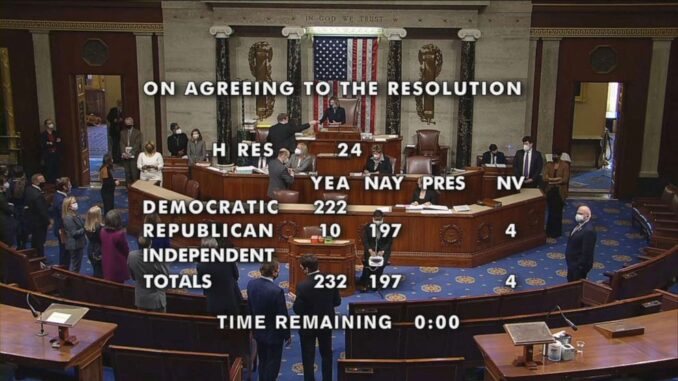
Teaching the Impeachment.
This is the third presidential impeachment for many of us Government teachers. Indeed there might be a few social studies teachers still in the classroom who taught during the Nixon ouster; they’d be 69+ today. These hearings and conflicts have all been challenging to teach as they seem to pit one intensely partisan group against another. Additionally, the Clinton affair and impeachment was riddled with R-rated material—a stained blue dress and a cigar. For me, teaching last year’s impeachment of Trump was not fun. It boiled down to me trying to explain a lot of minutiae relevant to the presidency, the national security apparatus, foreign policy, the federal criminal justice process, and Hunter Biden. The most common source for the intense student defenders of Trump was, of course, Trump’s Twitter feed. The students who favored impeachment and removal a year ago too often veered into the president’s general record, trying to re-litigate his presidency, or his general reputation, rather than simply asking whether it’s impeachable to withhold congressionally appropriated military aid to Ukraine in return for a government-announced smear against the Biden family.
Many of the teachable moments involved concepts and vocabulary relevant to the class, but it was so inconveniently out of sequence and so technical in nature. Questions like, “Why does Shifty Schiff get to be in charge of that committee?” warranted a full explanation of the committee system. My long-winded explanations to set the record straight that typically countered Trump’s Twitter narrative and the Social Media-Industrial Complex were met with suspicious looks.
This year’s impeachment seems easier. It is a more cut-and-dried case. The impeached official has already left office, so, there seems less at stake for both Trump’s disciples and his antagonists. The storyline and the evidence in question are rather simple, handy, vivid, and familiar. This impeachment is riddled with procedural and constitutional debate. An annoyance to many onlookers, but over-analysis of constitutionality is what we do. And whether one is for or against this particular process taking place for a variety of reasons, it is taking place and it’s too convenient an example not to utilize it. And we owe it to the students to clear things up and to assist them in absorbing this from reliable sources.
Last week, I whipped together a really easy and effective lesson. Students simply read the Constitution’s passages relevant to impeachment. You can lead them through those passages aloud and together in class, or if using an electronic copy of the document, have them hit Control-F/Command-F and type “impeachment” in the box. They can read and interpret all the relevant passages on their own for several minutes. Reading and analyzing the text passages will make many of these procedural and practical debates more obvious.
I then discussed the parallels and differences of a criminal proceeding and an impeachment-and-removal process with some terms and images on the board or screen. How an indictment and impeachment serve similar functions, ‘managers’ vs. ‘prosecutors,’ and so on. Then we read the Article of Impeachment, akin to an indictment. As a side, the document allowed for discussion of Congress’s lawmaking procedure, with the numbering of the bill, 117th Congress, “sponsors” of a bill, etc. This Washington Post article really breaks down the practical, legal, and historical questions involved in the process. And Senator Rand Paul’s challenge to the proceeding (maybe not the entire clip) provided some constitutional debate and some balance.
I find the class suspiciously quieter than before. It is admirable that they don’t want to go at each other. It is understandable that one side feels defeated and cannot understand why a public Senate trial is needed to accuse and humiliate their leader. On the other side of the classroom, some of the anti-Trumpers seem to treat it like a bad car wreck they don’t want to look at. None are happy about the situation. We must keep this in the front of our minds. No overkill, no emotion in the delivery, and sympathetic to those who lost the November game who see their leader getting slapped long after the buzzer. I’ve yet to ask the ultimate question: Should Trump be convicted? We’ll wait until after the trial.
Whether you’re teaching the impeachment deeply or on the edge, we should at least continue to periodically check in on it. It is the Constitution in action. It is historic. And with all the false info circulating out there, teachers need to assist our students in evaluating such sources to develop real media savvy.
David Wolfford teaches at Mariemont High School in Cincinnati and is author of AMSCO’s AP Government and Politics.